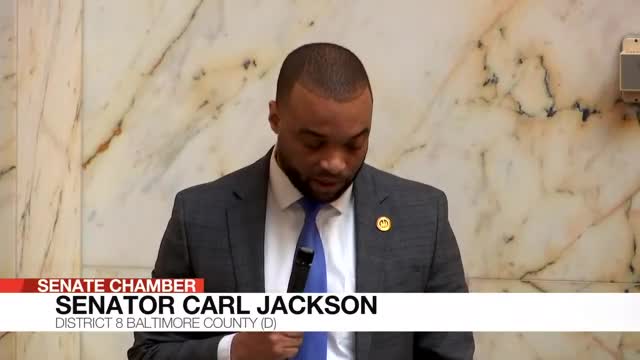Maryland Senate debates fiscal year 2026 budget amid federal economic concerns
April 01, 2025 | SENATE, SENATE, Committees, Legislative, Maryland
This article was created by AI summarizing key points discussed. AI makes mistakes, so for full details and context, please refer to the video of the full meeting. Please report any errors so we can fix them. Report an error »

In the heart of Maryland's Senate chamber, a pivotal session unfolded on April 1, 2025, as lawmakers navigated through critical budget discussions and legislative decisions. The atmosphere was charged with anticipation as senators prepared to address House Bill 350, the budget bill for fiscal year 2026, amidst a backdrop of economic uncertainty and political tension.
The session began with a smooth passage of House Bill 1141, which faced no opposition and garnered support from the Baltimore County Senate Delegation. With the favorable committee report adopted without objection, the Senate swiftly moved on to the budget discussions that would dominate the day.
As the Senate called for a quorum, the clerk confirmed the presence of 46 members, ensuring that the session could proceed. The budget bill was introduced, and discussions quickly turned to the challenges facing Maryland's economy. Senators expressed concerns about the impact of federal policies, particularly those stemming from the current administration in Washington.
One senator highlighted the state's precarious financial situation, noting that Maryland had to make significant budget cuts due to anticipated federal reductions. The mention of a looming "Trump recession" underscored the urgency of the discussions, as lawmakers sought to prepare for potential economic fallout. The senator emphasized the need for proactive measures, urging the administration to develop strategies to mitigate the effects of federal budget cuts on Maryland's economy.
In a spirited exchange, the vice chair of the budget committee defended the proposed budget, framing it as a protective measure for Maryland's residents. He pointed to efforts to safeguard essential services such as healthcare, education, and public safety, while also implementing tax relief for a majority of taxpayers. This budget, he argued, was a testament to Maryland's resilience in the face of external pressures.
However, dissenting voices emerged, with the minority leader attributing the state's fiscal challenges to an overreliance on federal funding. He argued that the previous administration had left a substantial surplus, and the current deficit was a direct result of changing federal policies. This perspective highlighted the ongoing debate about the balance between state and federal responsibilities in economic management.
As the session progressed, the senators engaged in a robust dialogue about the implications of the budget and the broader economic landscape. The discussions reflected not only the immediate concerns of Maryland's fiscal health but also the political dynamics at play, as lawmakers grappled with the realities of governance in a changing federal environment.
With the budget bill poised for a vote, the session encapsulated the complexities of state governance, where local decisions are often intertwined with national policies. As the Senate prepared to cast their votes, the outcome would not only shape Maryland's financial future but also signal the state's stance in the ongoing dialogue about federal-state relations. The stakes were high, and the implications of this budget would resonate far beyond the chamber walls.
The session began with a smooth passage of House Bill 1141, which faced no opposition and garnered support from the Baltimore County Senate Delegation. With the favorable committee report adopted without objection, the Senate swiftly moved on to the budget discussions that would dominate the day.
As the Senate called for a quorum, the clerk confirmed the presence of 46 members, ensuring that the session could proceed. The budget bill was introduced, and discussions quickly turned to the challenges facing Maryland's economy. Senators expressed concerns about the impact of federal policies, particularly those stemming from the current administration in Washington.
One senator highlighted the state's precarious financial situation, noting that Maryland had to make significant budget cuts due to anticipated federal reductions. The mention of a looming "Trump recession" underscored the urgency of the discussions, as lawmakers sought to prepare for potential economic fallout. The senator emphasized the need for proactive measures, urging the administration to develop strategies to mitigate the effects of federal budget cuts on Maryland's economy.
In a spirited exchange, the vice chair of the budget committee defended the proposed budget, framing it as a protective measure for Maryland's residents. He pointed to efforts to safeguard essential services such as healthcare, education, and public safety, while also implementing tax relief for a majority of taxpayers. This budget, he argued, was a testament to Maryland's resilience in the face of external pressures.
However, dissenting voices emerged, with the minority leader attributing the state's fiscal challenges to an overreliance on federal funding. He argued that the previous administration had left a substantial surplus, and the current deficit was a direct result of changing federal policies. This perspective highlighted the ongoing debate about the balance between state and federal responsibilities in economic management.
As the session progressed, the senators engaged in a robust dialogue about the implications of the budget and the broader economic landscape. The discussions reflected not only the immediate concerns of Maryland's fiscal health but also the political dynamics at play, as lawmakers grappled with the realities of governance in a changing federal environment.
With the budget bill poised for a vote, the session encapsulated the complexities of state governance, where local decisions are often intertwined with national policies. As the Senate prepared to cast their votes, the outcome would not only shape Maryland's financial future but also signal the state's stance in the ongoing dialogue about federal-state relations. The stakes were high, and the implications of this budget would resonate far beyond the chamber walls.
View full meeting
This article is based on a recent meeting—watch the full video and explore the complete transcript for deeper insights into the discussion.
View full meeting
